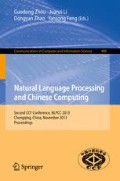Abstract
Chinese microblog is a popular Internet social medium where users express their sentiments and opinions. But sentiment analysis on Chinese microblogs is difficult: The lack of labeling on the sentiment polarities restricts many supervised algorithms; out-of-vocabulary words and emoticons enlarge the sentiment expressions, which are beyond traditional sentiment lexicons. In this paper, emoticons in Chinese microblog messages are used as annotations to automatically label noisy corpora and construct sentiment lexicons. Features including microblog-specific and sentiment-related ones are introduced for sentiment classification. These sentiment signals are useful for Chinese microblog sentiment analysis. Evaluations on a balanced dataset are conducted, showing an accuracy of 63.9% in a three-class sentiment classification of positive, negative and neutral. The features mined from the Chinese microblogs also increase the performances.
This work was supported by Natural Science Foundation (61073071), National High Technology Research and Development (863) Program (2011AA01A207). Part of this work has been done at the NUSTsinghua EXtreme search centre (NExT).
Access this chapter
Tax calculation will be finalised at checkout
Purchases are for personal use only
Preview
Unable to display preview. Download preview PDF.
References
Barbosa, L., Feng, J.: Robust sentiment detection on twitter from biased and noisy data. In: Coling 2010: Posters, Beijing, China, pp. 36–44 (2010)
Bollen, J., Mao, H., Zeng, X.: Twitter mood predicts the stock market. Arxiv preprint arXiv:1010.3003 (2010)
Chang, C.C., Lin, C.J.: Libsvm: A library for support vector machines. ACM Trans. Intell. Syst. Technol. 2(3), 27:1–27:27 (2011)
Cui, A., Zhang, M., Liu, Y., Ma, S.: Emotion tokens: bridging the gap among multilingual twitter sentiment analysis. In: Proceedings of the 7th Asia Conference on Information Retrieval Technology, AIRS 2011, pp. 238–249 (2011)
Hu, M., Liu, B.: Mining and summarizing customer reviews. In: Proceedings of the 10th ACM SIGKDD Conference, pp. 168–177. ACM (2004)
Jansen, B.J., Zhang, M., Sobel, K., Chowdury, A.: Micro-blogging as online word of mouth branding. In: CHI 2009, pp. 3859–3864 (2009)
Kim, S.M., Hovy, E.: Determining the sentiment of opinions. In: Proceedings of the 20th COLING Conference, p. 1367. ACL (2004)
Liu, K.L., Li, W.J., Guo, M.: Emoticon smoothed language models for twitter sentiment analysis. In: 26th AAAI Conference on Artificial Intelligence (2012)
Neviarouskaya, A., Prendinger, H., Ishizuka, M.: Sentiful: A lexicon for sentiment analysis. IEEE Transactions on Affective Computing 2(1), 22–36 (2011)
Pak, A., Paroubek, P.: Twitter as a corpus for sentiment analysis and opinion mining. In: Proceedings of LREC, vol. 2010 (2010)
Pang, B., Lee, L.: Opinion mining and sentiment analysis. Foundations and Trends in Information Retrieval 2(1-2), 1–135 (2008)
Strapparava, C., Mihalcea, R.: Learning to identify emotions in text. In: Proceedings of the 2008 ACM Symposium on Applied Computing, pp. 1556–1560 (2008)
Tumasjan, A., Sprenger, T.O., Sandner, P.G., Welpe, I.M.: Predicting elections with twitter: What 140 characters reveal about political sentiment. In: Proceedings of the 4th AAAI Conference on Weblogs and Social Media, pp. 178–185 (2010)
Turney, P.D.: Thumbs up or thumbs down?: semantic orientation applied to unsupervised classification of reviews. In: ACL 2002, pp. 417–424 (2002)
Wang, H., Liu, C., Zheng, Y., Liu, J., Qu, P., Zou, C., Xu, R., Cheung, R.: Sentiment analysis of negative sentences and comparative sentences. In: The Fourth Chinese Opinion Analysis Evaluation, pp. 52–67 (2012)
Xu, L., Lin, H., Pan, Y., Ren, H., Chen, J.: Constructing the affective lexicon ontology. Journal of the China Society for Scientific and Technical Information 27(2), 180–185 (2008)
Zhang, H.: Nlpir chinese word segmentation system, http://ictclas.nlpir.org/
Zhang, W., Liu, J., Guo, X.: Positive and Negative Words Dictionary for Students. Encyclopedia of China Publishing House (2004)
Author information
Authors and Affiliations
Editor information
Editors and Affiliations
Rights and permissions
Copyright information
© 2013 Springer-Verlag Berlin Heidelberg
About this paper
Cite this paper
Jiang, F., Cui, A., Liu, Y., Zhang, M., Ma, S. (2013). Every Term Has Sentiment: Learning from Emoticon Evidences for Chinese Microblog Sentiment Analysis. In: Zhou, G., Li, J., Zhao, D., Feng, Y. (eds) Natural Language Processing and Chinese Computing. NLPCC 2013. Communications in Computer and Information Science, vol 400. Springer, Berlin, Heidelberg. https://doi.org/10.1007/978-3-642-41644-6_21
Download citation
DOI: https://doi.org/10.1007/978-3-642-41644-6_21
Publisher Name: Springer, Berlin, Heidelberg
Print ISBN: 978-3-642-41643-9
Online ISBN: 978-3-642-41644-6
eBook Packages: Computer ScienceComputer Science (R0)

